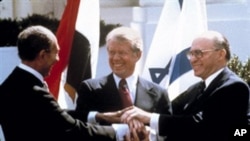In the days since Egyptian protestors first descended upon Cairo’s Tahrir Square, pundits and politicians have been keeping a watchful eye on Egypt’s strongest Islamic group, the Society of Muslim Brothers—more commonly known as the Muslim Brotherhood. Many have voiced fears that if President Hosni Mubarak steps down, the Brotherhood will step in and transform the country into Iranian-style Islamic republic—and an asylum for terrorists. And perhaps no one worries more than neighboring Israel.
March 26, 1979: After after months of negotiations, Egyptian President Anwar Sadat, Israeli Prime Minister Menachem Begin and US President Jimmy Carter smiled and shook hands on the White House lawn, jubilant over having signed what was officially entitled, the Treaty of Peace Between the Arab Republic of Egypt and the State of Israel. The document ended years of warfare and called for both countries to officially recognize one another. It mandated that Israel withdraw from land it captured in the Sinai Peninsula. It allowed for the free passage of Israeli ships through the Suez Canal. Sadat congratulated Carter for having performed a miracle, but the US President cautioned that obstacles still remained ahead.
Egypt and Israel have maintained a cautious peace ever since. The neighbors have diplomatic relations; and they cooperate in trade, tourism and agriculture. But now, some in Israel worry that the ongoing revolution in Egypt could change all that.
Isi Leibler, former chairman of the governing board of the World Jewish Congress and commentator for the Jerusalem Post, is among those who express fears about any post-Mubarak Egypt. He says he’s no fan of the Egyptian leader. But at the same time, Leibler worries that if Mubarak leaves office, the Muslim Brotherhood will gain a strong foothold in the government and ultimately destroy the peace treaty: “Because,” he said, “the most powerful force operating in Egypt and in many of these Arab countries are the Islamic fundamentalist groups. And the Muslim Brotherhood is particularly well-organized as a semi-underground movement in Egypt.
Leibler does not believe what some analysts believe—that because the Brotherhood has been so suppressed in Egypt, over time, it has learned the value of restraint. “I think they will practice the same restraint as Hamas practices, because they’re soul brothers, those two groups,” Liebler said. “They are identical. They have ideological origins and they are extremist fundamentalists, and if they play the game, it will only be temporarily.” Liebler said Muslim Brothers are not only committed to breaking peace with Israel, but have publicly announced that they want to see “Israel eliminated as a state.”
“For anybody to look towards them as a source of any kind of stability,” he added, “I think they’re living in a fool’s paradise.”
Leibler articulated the often-expressed belief that Israel’s security is dependent upon the political survival of Hosni Mubarak. However, some other analysts in Israel applaud the Egyptian protesters. They say Israeli security can only strengthen as its Arab neighbors democratize, and dismiss worries about a resurgence of Islamism next door. Among these voices is Larry Derfner, who also writes for the Jerusalem Post.
“It’s fear that’s dictating the Israeli reaction,” he told VOA. “But there’s such a thing as too much fear. I think most people who know about Egypt, who are looking at Egypt and trying to be level-headed about it, are saying that Muslim Brotherhood is probably not going to take over Egypt, and that the movement in Egypt is dominated by democrats.”
The Muslim Brotherhood is not in a position to be able to deliver to protestors what they want in a government, said Derfner. “They want democracy, which the Muslim Brotherhood is not going to give them. And at least as much as democracy, they want economic growth. And Islamism and alliance with the Islamic world is not going to give them that. And trashing the Israeli peace treaty is not going to give them that.”
Then what would? Derfner’s answer was emphatic: “Playing ball with America and the West.”





